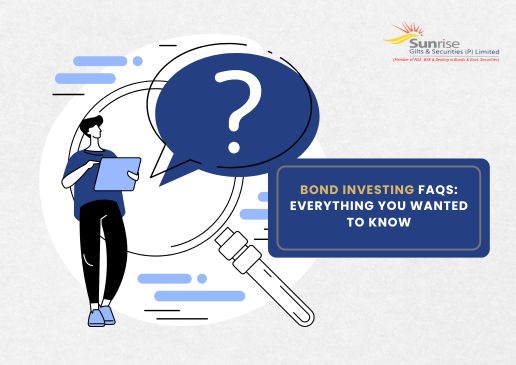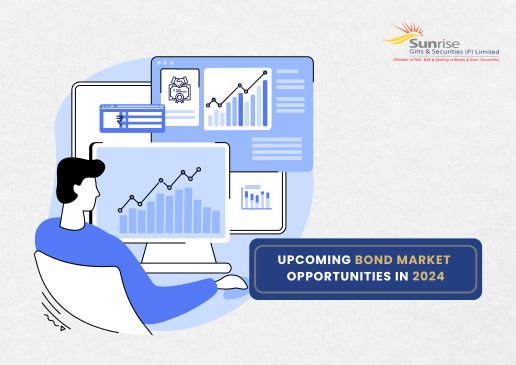
Navigating Risks: What You Must Know Before Investing in Bonds
Bonds can provide a stable income and help preserve your capital. But, like all investments, they come with their own risks. Sunrise Gilts & Securities Limited is a 20-year old company with a reputation for trust and financial expertise. We offer tailored services that will meet your needs. What you should know about bonds before investing.
1. Interest Rate Risk
Bond investors are concerned about interest rate risk. Bond prices usually fall when interest rates increase, and vice versa. This inverse relationship may impact the value your bond investments if you have to sell them prior to maturity. When purchasing bonds, it's important to take into account the interest rate environment as well as your investment horizon.
2. Credit Risk
Credit risk is the possibility of the bond issuer defaulting on its payments. Bonds issued by entities that have lower credit ratings are more likely to be at risk. We at Sunrise Gilts & Securities stress the importance of knowing the creditworthiness and bond issuers. Credit ratings and detailed analyses are provided to assist you in making informed decisions.
3. Inflation Risk
The inflation rate reduces the purchasing power from fixed income bonds. The real value of your return will decrease if the inflation rate is higher than the interest rate on the bond. We offer inflation-linked bonds and other investment options to protect the real value of your investment.
4. Liquidity risk
The liquidity risk is the ease of buying or selling a bond in the market, without affecting the price. Bonds with low liquidities can be hard to sell or require a discount. Our extensive network and market insight ensures that you can access bonds with sufficient liquidity to align with your investment strategy
5. Reinvestment Risk
Reinvestment Risk is the risk that you will have to reinvest the proceeds of a bond with a lower rate than what was originally offered. This occurs most often when bonds are called prior to maturity or in periods of falling interest rates. We help identify bonds that have call protection features in order to reduce this risk.
6. Market Risk
Market risk is the risk that the bond market will decline due to events such as economic, political or market-specific. Our analysts are constantly monitoring market trends, geopolitical events and market volatility to give you timely advice and strategies.
7. Call Risk
Call features are available on some bonds. This allows the issuer to redeem bonds before their maturity date, usually when interest rates drop. This can reduce your income potential from interest payments. We will help you to understand the call provisions, and we'll recommend bonds that meet your income expectations and risk tolerance.
Why Sunrise Gilts & Securities?
Sunrise Gilts & Securities is committed to providing you with the knowledge and tools necessary to manage these risks. What makes us different?
Expertise and experience: We have over 20 years of experience in the Fixed Income Market.
Comprehensive Services: We provide a variety of investment options for both experienced and novice investors.
Credible Insights : Our financial expertise is rooted in the ground, ensuring that you get accurate and up-to date market insights.
Customer-Centric approach: We prioritise your investment goals and appetite for risk, and provide personalized advice and solutions.
Bonds can form the cornerstone of an investment portfolio that is well-diversified. Understanding and managing risks will help you make decisions that are in line with your financial goals. We are here at Sunrise Gilts & Securities to help you along the way. Our goal is to make your investment journey as profitable and smooth as possible
Limited Market Access: Retail investors historically faced hurdles accessing primary markets for corporate bonds, which were primarily accessible to institutional investors and high-net-worth individuals.
The Emergence of Bond Public Issues
Corporate bonds were long considered exclusive to institutional investors and wealthy individuals, creating a disconnect between retail investors and the corporate debt markets. To bridge this gap, Indian regulators introduced Bond Public Issues or NCD IPOs.
Bond Public Issues or NCD IPOs are public offerings that grant retail investors access to corporate bonds. This innovation broadens the market's accessibility, potentially allowing a more extensive range of investors to capitalize on corporate debt investments.
Advantages of Bond Public Issues for Retail Investors
For retail investors seeking to venture into corporate debt markets, Bond Public Issues present a compelling opportunity:
Lower Minimum Investment: Bond Public Issues typically require lower minimum investments, often as low as Rs. 10,000, making it accessible to smaller investors.
Primary Market Access: Retail investors can directly access the primary market for corporate bonds through Bond Public Issues, enabling participation in initial issuances and a broader spectrum of investment choices.
Primary Market Access: Retail investors can directly access the primary market for corporate bonds through Bond Public Issues, enabling participation in initial issuances and a broader spectrum of investment choices.
Diversification: Investing in corporate bonds through Bond Public Issues allows retail investors to diversify their portfolios with fixed-income instruments, reducing overall portfolio risk and potentially providing a stable income stream.
Liquidity: Bond Public Issues offer liquidity, as these bonds can be traded on secondary markets after the initial issuance, allowing investors to buy or sell based on their needs.
Transparent Pricing and Trading: Bond Public Issues provide retail investors with a transparent and regulated market, ensuring fair pricing and trading mechanisms, in contrast to less transparent over-the-counter transactions.
Building Investor Confidence: SEBI's stringent regulations govern primary bond issuances, ensuring transparency and empowering investors to make informed choices. This regulatory oversight builds investor confidence, especially among first-time investors.
As retail investors gain experience and familiarity with the market, they can expand their portfolios by exploring other corporate bonds.
How to Apply for a Bond Public Issue
Investing in bonds has become increasingly convenient, facilitated by platforms like TheFixedIncome.com. The process is streamlined and accessible, requiring no KYC or registration, and payments can be made easily via UPI, similar to equity investments. The minimum investment amount is also modest, starting at just Rs. 10,000, enabling prospective investors to embark on their bond investment journey swiftly.
Risks and Considerations
While Bond Public Issues offer an attractive proposition for retail investors, it's crucial to be mindful of potential risks:
Interest Rate Risk: Fluctuations in interest rates can impact the value of bond investments. It's essential for investors to stay informed and consider interest rate changes when making investment decisions.
Credit Risk: Bond investments entail credit risk, where the issuer may default on interest or principal payments. Investors must assess the issuer's creditworthiness by analyzing financial stability, performance, and debt-to-equity ratio.
Market Conditions: Bond prices are influenced by various factors, including overall market conditions, economic indicators, and investor sentiment. Retail investors should carefully evaluate prevailing market trends before making investment decisions.
Conclusion
Bond Public Issues have emerged as a promising avenue for retail investors to access India's corporate debt markets. These initial public offerings empower investors to diversify their portfolios, earn consistent returns, and participate in the primary market for corporate bonds.
At The Fixed Income, our team of experts plays a crucial role in guiding retail investors through Bond Public Issues to access corporate debt markets. We offer insights and analysis to help investors assess issuer creditworthiness and evaluate the risk-return profile of various bond offerings.
Disclaimer: This article is for general educational purposes and awareness only and should not be construed as comprehensive investment advice. It does not guarantee the completeness or accuracy of information and disclaims all liabilities, losses, and damages arising from its use. Investments in the debt market carry market risks; therefore, readers should carefully review all documents and consider professional advice before making investment decisions.













